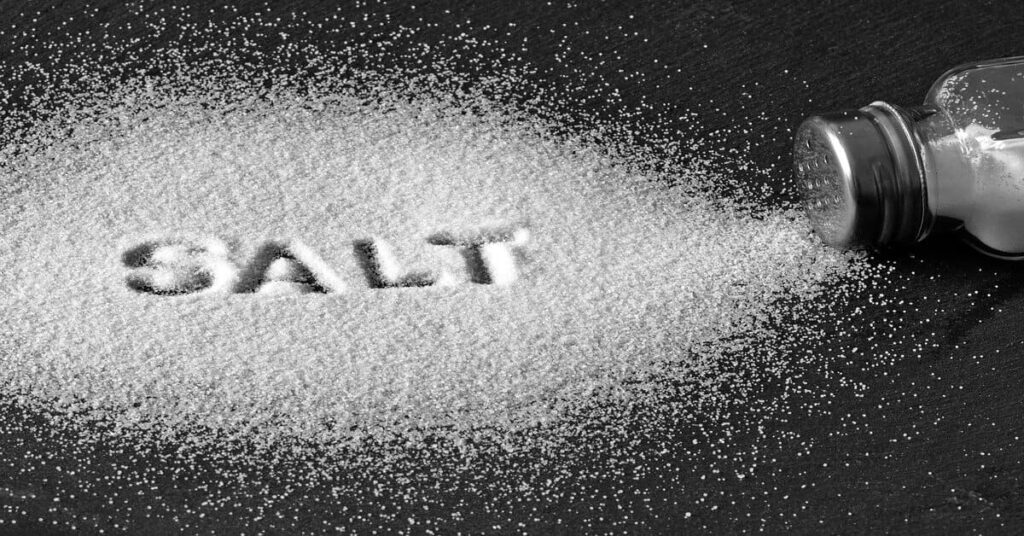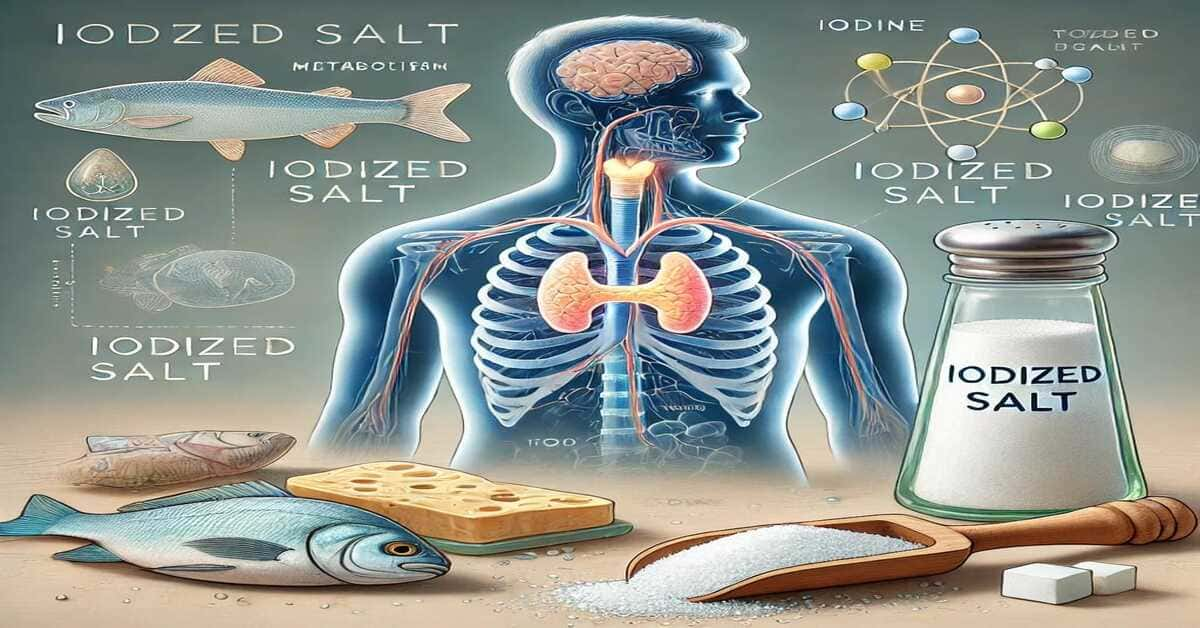Iodised salt is a type of salt that contains small amounts of sodium iodide or potassium iodide. It’s normal salt that has been sprayed with potassium iodate. Iodine is a trace mineral common in dairy products, grains, eggs etc. This article answers “Why is the use of iodised salt advisable ?”
Importance of Iodine in the Body
- Iodine is essential for the production of thyroid hormones. Thyroid hormones are needed for proper bone and brain development.
- It regulates metabolism, growth, and development.
- Iodine is necessary for the proper functioning of the thyroid gland.
- It helps to prevent iodine deficiency disorders. It is very important for everyone to get enough iodine especially for infants and women who are pregnant.
- 110 mcg is the required amount of iodine at the time of birth and adults need 150 mcg of iodine every day.
Iodine Sources
- Fish (such as cod and tuna), seaweed, shrimp, and other seafood, which are generally rich in iodine
- Dairy products (such as milk, yogurt, and cheese) and eggs, which are also good sources of iodine
- Iodized salt, which is readily available in the India and many other countries.
How Iodized Salt is Made
Iodized salt is made by adding potassium iodate or sodium iodide to regular salt. The iodine is added to the salt in a controlled environment. The iodized salt is then packaged and distributed to consumers. The iodine content is carefully monitored to ensure it meets safety standards. Iodized salt making can be done by one or more of the following processes :-
How much iodine is needed
- Birth to six months: 110 micrograms
- Infants 7 to 12 months: 130 micrograms
- Children 1 to 8 years: 90 micrograms
- 9 to 13 years: 120 micrograms
- Teens 14 to 18 years: 150 micrograms
- Adults: 150 micrograms
- Pregnant women: 220 micrograms
- Breast feeding women: 290 micrograms
Benefits of Iodized Salt
We should have it in moderation. There are multiple benefits of having iodised salt:
- Iodized salt helps to regulate metabolism by increasing the production of thyroid hormones like triiodothyronine and thyroxine. These harmones regulate blood pressure, body temperature, and heart rate.
- It supports the breakdown of carbohydrates, fats, and proteins.
- Iodized salt helps to maintain a healthy weight.
- It supports the growth and development of cells.
- Iodized salt helps to prevent goitre by providing the necessary iodine for thyroid function.
- It reduces the risk of thyroid enlargement and goitre.
- Iodized salt helps to prevent iodine deficiency disorders.
- It supports the overall health of the thyroid gland.
- it can also help combat cretinism, which affects both the mental and physical growth of the unborn child. After birth, cretinism may lead to loss of speech and hearing as well as affect a child’s body movements. A balanced iodine level in pregnant women can also help prevent miscarriages and hypothyroidism.
- Iodized salt has a counter effect on harmful metals like mercury and lead. It acts to repel these toxins and restore the right pH level in the body.
- It also helps prevent harmful bacteria from multiplying in the intestines.
- It also helps to burn extra fat deposits that could lead to heart disease.
Health Risks of Iodine Deficiency
Enlargement of the Thyroid Gland
- Iodine deficiency can cause the thyroid gland to enlarge. This can lead to goitre and other thyroid problems.
- Iodine deficiency can cause the thyroid gland to become underactive.
Swollen Neck
Iodine deficiency can cause the neck to become swollen. This is due to the enlargement of the thyroid gland.
Impaired Metabolism
- Iodine deficiency can impair metabolism.
- This can lead to weight gain and other health problems.
- Iodine deficiency can cause the body to become less efficient.
Other Risks
- Difficulty in learning during childhood
- Fibrocystic breast disease
- Radiation-induced throat cancer
- Dry skin and Increased sensitivity to cold
- Fatigue and hair loss
Iodine Requirements and Intake
Recommended Daily Intake of Iodine
The recommended daily intake of iodine varies by age and sex. Pregnant and breastfeeding women require more iodine. The recommended daily intake of iodine is 150 micrograms. This can be achieved through a balanced diet and iodized salt. Following are the daily intakes of iodine for various categories :
- Birth to six months: 110 micrograms
- Infants 7 to 12 months: 130 micrograms
- Children 1 to 8 years: 90 micrograms
- 9 to 13 years: 120 micrograms
- Teens 14 to 18 years: 150 micrograms
- Adults: 150 micrograms
- Pregnant women: 220 micrograms
- Breast feeding women: 290 micrograms
Consequences of Excessive Iodine Consumption
- Excessive iodine consumption can have negative health effects.
- Excessive iodine consumption can lead to iodine toxicity. This can cause a range of health problems.
- Getting high levels of iodine can cause some of the same symptoms as iodine deficiency, including goiter (an enlarged thyroid gland). High iodine intakes can also cause thyroid gland inflammation and thyroid cancer.
- Getting a very large dose of iodine (several grams, for example) can cause burning of the mouth, throat, and stomach; fever; stomach pain; nausea; vomiting; diarrhea; weak pulse; and coma.
The daily upper limits for iodine
| Life Stage | Upper Limit |
| Birth to 12 months | Not established |
| Children 1–3 years | 200 mcg |
| Children 4–8 years | 300 mcg |
| Children 9–13 years | 600 mcg |
| Teens 14–18 years | 900 mcg |
| Adults | 1,100 mcg |
Read Further to know “Why is the use of iodised salt advisable ?”…

Importance and effects of Iodine on health
Role of Iodine in Thyroid Function
- Iodine is essential for the production of thyroid hormones.
- It regulates the thyroid gland’s activity. Iodine is necessary for the proper functioning of the thyroid gland.
- It helps to prevent iodine deficiency disorders.
Read about “Election Process in India“
Effect on Fetal and infant development
Breastfed infants get iodine from breast milk. The iodine content of breast milk depends on how much iodine the mother gets. several national and international groups recommend that pregnant and breastfeeding women and infants take iodine supplements. The American Thyroid Association recommends that women who are pregnant, planning to become pregnant, or breastfeeding take a daily supplement containing 150 mcg iodine as potassium iodide.
Effect on Fibrocystic breast disease
Although not harmful, fibrocystic breast disease causes lumpy, painful breasts. It mainly affects women of reproductive age but can also occur during menopause. Very high doses of iodine supplements might reduce the pain and other symptoms of fibrocystic breast disease, but more study is necessary to confirm this.
Is Iodized Salt Safe for Everyone ?
- Iodized salt is generally safe for everyone.
- However, excessive consumption can have negative health effects.
- Iodized salt is not recommended for people with certain health conditions.
- It is essential to consult with a healthcare professional before consuming iodized salt.
How to Choose the Right Iodized Salt ?
There are different type of salts available like :
Table Salt
This is the cheapest salt but also most processed and stripped of trace minerals.
Sea Salt
It contains trace minerals and its large crystals lend a more intense flavour.
Celtic Salt
It is grayish in color and retains ocean’s moisture. It is harvested in Brittany region of the Celtic Sea.
Fleur de sel
It is fragile and collected by hand.
Alaea (Hawaiian Salt)
It is coarse and unrefined with a distinct pink-brownish color from native volcanic red clay.
Flaked Salt
It is soft and has pyramid like flakes that dissolve quickly.
Kosher Salt
It is iodine free and minimally processed with a flaky, coarse structure. It is perfect for curing meat.
Himalayan Pink Salt
It is packed with trace minerals. Crystals are hard and dry with a sharp flavour.
Choose an iodized salt that is low in sodium. Opt for an iodized salt that is free from additives. Select an iodized salt that is made from natural ingredients. It is advisable to consult with a healthcare professional before deciding for salt.
Conclusion (Why is the use of iodised salt advisable)
Iodized salt is a simple and effective way to meet iodine requirements but It is essential to consume iodized salt in moderation. Iodized salt can have negative health effects if consumed excessively. It is essential to consult with a healthcare professional before consuming iodized salt.
